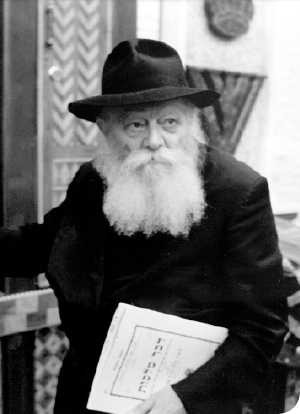THE CONNECTION OF MOSHIACH TO THE REBBEIM
The intended result is, therefore, certainly achieved – that there should be the revelation of the name of Moshiach, and even the revelation of Moshiach himself (as he is beyond his name). * From Chapter Six of Rabbi Shloma Majeski’s Likkutei Mekoros (Underlined text is the compiler’s emphasis.)
Translated by Boruch Merkur
 6. The connection between Erev Rosh HaShana and the redemption (being judged favorably) is further accentuated in recent times, through the birthday of the Tzemach Tzedek on this day (in the year 5559):
6. The connection between Erev Rosh HaShana and the redemption (being judged favorably) is further accentuated in recent times, through the birthday of the Tzemach Tzedek on this day (in the year 5559):
The name of the Tzemach Tzedek (who is called by the title of his Torah work Tzemach Tzedek) is the name of Moshiach Tzidkeinu, who is called “Tzemach” as well as “Tzedek.”*
Also, regarding the connection between the Tzemach Tzedek and Moshiach Tzidkeinu: The Tzemach Tzedek, the third Nasi of the Chabad Rebbes, contains within him all the N’siim. This general, inclusive quality of the Tzemach Tzedek is recognizable in his teachings, which contain the Torah of all the preceding N’siim, as well as the N’siim who followed him, including my revered father in-law, leader of our generation. Now, the Rebbes and N’siim – and the general concept of the revelation of the inner dimension of the Torah, and the dissemination of the wellsprings of Chassidus outward through our Rebbes and N’siim – are connected with the advent of Moshiach Tzidkeinu. This is especially the case with the Rebbe, my father in-law, leader of our generation, as alluded to in his name, Yosef Yitzchok, as in the verse, “yosif Ad-nai sheinis yado – the L-rd shall continue to apply His hand a second time to acquire the rest of His people.” It is, therefore, clear that this quality – the connection of the Rebbes to Moshiach – is prominent in the Tzemach Tzedek, who includes within him all the N’siim.
Thus it is understood that on the birthday of the Tzemach Tzedek (on Erev Rosh HaShana), when “his mazel rules,” the name of Moshiach also rules, meaning that the baal yom ha’huledes [the Tzemach Tzedek, whose birthday we celebrate] does everything incumbent upon him. The intended result is, therefore, certainly achieved – that there should be the revelation of the name of Moshiach, and even the revelation of Moshiach himself (as he is beyond his name).
Similarly, as this message applies to the soul: Our Sages say that “it [the soul] is called by five names” (Nefesh, Ruach, Neshama, Chaya), including the fifth, Yechida, and beyond that – the very essence of the soul (insofar as “it is called by five names”).
So too with regard to Moshiach – that in addition to the revelation of the name of Moshiach, as he is connected with Yechida (the collective Yechida), there is also the essence of Moshiach Tzidkeinu, which is one with the very essence of G-d. Thus, the revelation of Moshiach (on Erev Rosh HaShana) is connected with accepting the kingship of G-d on Rosh HaShana, as discussed above, as well as the revelation of Malchus (“Nitzav Melech”) within every Jew, as is also derived from the ruling of the Tur in connection with Erev Rosh HaShana, discussed above.
(To note that the Tur is the foundation of the Beis Yosef, which is the foundation of the Shulchan Aruch Beis Yosef. The latter, in turn, is the foundation of the Alter Rebbe’s Shulchan Aruch, regarding which the Tzemach Tzedek based much of his responsa and commentary.)
NOTES:
*Footnote 42: “Tzemach” – “Ish Tzemach shmo – a man, whose name is Tzemach” (liturgy of Hoshaanas on Hoshana Rabba, from Zecharia 6:12 (and the commentaries there). See ibid 3:8.); “Tzedek” – “V’haya tzedek azur b’masnav – righteous shall be girded upon his loins” (Yeshaya 11:5). And see Yermiyahu 23:5 and the commentary of Rashi. Ibid 33:15.
(From the address of Erev Rosh HaShana 5752; Seifer HaSichos 5752, pg. 6-7)
 May 17, 2016
May 17, 2016
Reader Comments